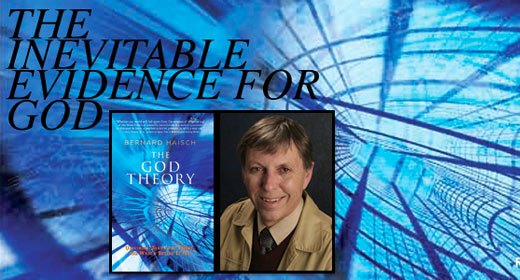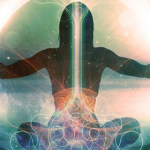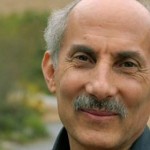by Bernard Haisch: Excerpted from The God Theory, Universes, Zero-Point Fields, and What’s Behind It All ©2006 ©2009 Red Wheel/Weiser, LLC With Permission by Author

Remarkable discovery has gradually emerged in astrophysics over the past two decades and is now essentially undisputed: that certain key physical constants have just the right values to make life possible. In principle these constants could have taken on values wildly different from what they actually are, but instead, they are in some cases within a few percent of the “just right” values permitting us to exist in this universe. As Sir Martin Rees, the British Astronomer Royal and one of the world’s foremost cosmologists writes in his widely read Just Six Numbers: “Our emergence and survival depend on very special ‘tuning’ of the cosmos — a cosmos that may be vaster than the universe that we can actually see.”
Science today is based on the premises of materialism, reductionism, and randomness. Materialism is the belief that reality consists solely of matter and energy, the things that can be measured in the laboratory or observed by a telescope. Everything else is illusion or imagination. Reductionism is the belief that complex things can be explained by examining the constituent pieces, such as the illusion of consciousness arising from elementary chemical processes in the brain. Randomness is the conviction that natural processes follow the laws of chance within their allowed range of behavior.
Given those beliefs there is one and only one way to explain the fine-tuning of the universe: An infinite number of universes must exist, each with unique properties, each randomly different from the other, with ours only seemingly special because in a universe with different properties we would never have originated. Our existence is only possible in this particular universe, hence the tuning is an illusion. This view suffers from three problems.
First of all, quantum fluctuations are a key ingredient of inflation theories that attempt to address how our universe, and myriad others, came into being. The problem is that quantum fluctuations presuppose the existence of quantum laws. If there truly were no quantum laws or any other laws whatsoever, nothing could happen. No laws, no action. The origin of universes as a result of quantum laws, inflation fields, or other arcane properties of string theory depends upon the preexistence of those laws or fields. And so, even the skeptical scientist cannot avoid taking that on faith.
The second problem is that none of the other universes can ever be observed, not even in principle, since trying to measure across universes with different fundamental laws would be like using a microphone to observe the moon or using a telescope to record a rock band. So, yet a second article of faith is required of the modern scientist: the existence of an infinite number of unseen universes.
The final problem is more personal. If we are nothing but physical beings originating by chance in a random universe, then there really can be no ultimate purpose in our lives. This is not only bad news for us individually, it undermines the ethical and moral underpinnings of society and civilization.
I propose a theory that does provide a purpose for our lives while at the same time being completely consistent with everything we have discovered about the universe and about life on earth, in particular the Big Bang, a 4.6 billion-year-old earth, and, of course, evolution. The single difference between the theory I propose and the ideas current in modern astrophysics is that I assume that an infinite conscious intelligence preexists. We cannot get away from the preexistence of something, and whether that is an ensemble of physical laws generating infinite random universes, or an infinite conscious intelligence, is something present-day science cannot resolve, and indeed one view is not more rational that the other.
One could argue that one view is supported by evidence and the other is not. I would agree one hundred percent. The evidence for the existence of an infinite conscious intelligence is abundant in the accounts of the mystics, the meditative, the prayerful, and sometimes the spontaneous exceptional experiences of human beings throughout history. The evidence for random universes is precisely zero. Most scientists will reject the former type of evidence as merely subjective, but that simply reduces the contest of views to a draw: zero on both sides.
What I propose is an infinite conscious intelligence – so let’s call it god – who has infinite potential, whose ideas become the laws of physics of our universe and others, and whose purpose in so doing is the transformation of potential into experience. The difference between being able to do something and actually doing it is vast: making it happen, experiencing what it feels like, savoring the sensations are the tremendous difference between theory and practice. Playing the game is far more satisfying than reading the rules. What greater purpose could there be for each of us humans than that of creating God’s experience? God experiences the richness of its potential through us because we are the incarnation of God in the physical realm.
Much of today’s religious dogma concerning God and the nature and destiny of mankind is flawed and irrational. It fails to resolve basic paradoxes – like why bad things happen to good people, and why some are born into privilege and some into starvation and misery. Moreover, the conflicting claims of the world’s religions contribute directly to the violence and hatred that afflicts much of the planet. On the other hand, rejecting anything pejoratively called supernatural in the name of science is equally flawed and irrational.
I propose a God whose purposeful ideas somehow became the laws of nature underlying our universe. I propose a God whose infinite diversity of ideas was capable of initiating the Big Bang some 14 billion years ago, and also of supporting all the other universes in the multiverse that astrophysical inflation theory has cobbled up over the years. The difference between my proposed worldview and the prevailing reductionism of modern science is that its theories rest squarely on enigmatically preexisting and randomly distributed “laws of nature” mindlessly giving rise to universes that are utterly devoid of purpose.
I am gambling that a closer examination of spiritual realities will also appeal to skeptical reductionists plagued by the (nagging and perhaps secretly welcome) suspicion that there may, after all, be more to life than the equations of physics. What I propose may also appeal to those who, although open to the idea of a benevolent deity, are put off by the dogmatism of organized religion.
I am also betting that scientific discoveries in the new millennium will substantiate that the rich inner world of consciousness we all share is more than just a neurophysiological epiphenomenon. I’m betting that, before too long, we will understand how consciousness, at a fundamental level, creates matter, not vice versa. This view has roots deep in ancient mystical traditions, but is currently heretical to modern science.
The book, The God Theory, summarizes the thoughts of an inquisitive, but open-minded, scientist. What I present here is a theory that looks promising, not scientific proof. It should not be surprising, however, if some of what I propose coincides with theories propounded by others who claim a more intimate relationship with the “Almighty.” After all, if I am on the right track, and if they are, it would be worrisome if we were not, ultimately, in agreement. I ask that you seriously consider the logic, especially if it challenges you to question what you were taught – in Sunday school, in catechism, or dare I say, in physics class.
Dr. Bernard Haisch is an astrophysicist, author of over 130 scientific publications, and was an editor of the Astrophysical Journal for ten years. His professional positions include staff scientist at Lockheed Martin Solar and Astrophysics Laboratory, deputy director of the Center for Extreme Ultraviolet Astrophysics at the University of California, Berkeley, and visiting scientist at the Max-Planck- Institute for Extraterrestrial Physics in Germany. Prior to his career in astrophysics, Haisch was a student for the Catholic priesthood.









































